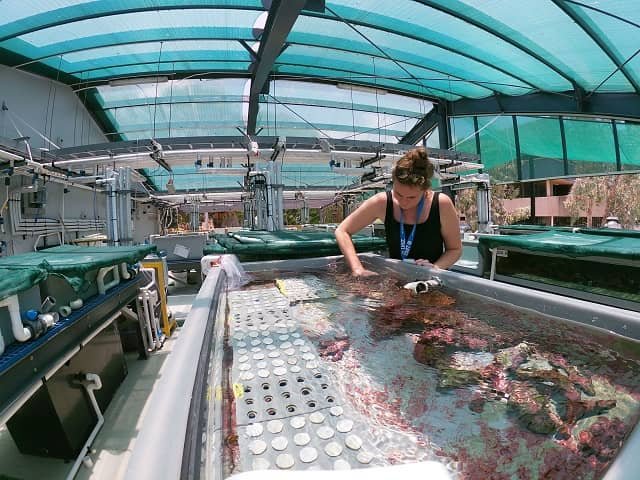Kiel, Germany.- Organisms like algae, mussels or barnacles rapidly colonise surfaces in maritime applications, such as ship hulls. The protective coatings primarily used to date contain substances like copper, which are harmful to the environment. The nets used in fish farming are also largely impregnated with copper-based coatings and release environmentally-toxic copper compounds into the water. A team at Kiel University (CAU) is researching environmentally-friendly polymer coatings to minimise fouling by marine organisms.
In the project “CleaNet”, together with a manufacturer of fishing nets, they aim to develop a coating material which is specially adapted to the specific requirements of nets in aquaculture. The project, which started on 1 April, is funded by the Federal Ministry for Economic Affairs and Energy (BMWi) and the Central Innovation Programme for SMEs (ZIM), of which €200,000 will go to the CAU. At the Hannover Messe, the team will present the underlying approach and further areas of application such as shipping, industrial food processing or medical technology (CAU booth, Hall 2, CO7).
Many kilogrammes of biomass per square meter may be present if marine organisms colonise the nets which are used in marine and coastal aquaculture. As a result, the supply of oxygen and nutrients inside the nets may be greatly reduced, which has a negative impact on the development of the fish. The mechanical strain due to the extra weight can cause so much damage to the nets that they tear and release the farmed fish into the ocean. In addition to the economic loss for fish farming, many countries like Norway impose high fines for this.
To date, nets colonised with organisms are painstakingly cleaned, frequently replaced, or given protective coatings containing copper. “With our environmentally-friendly coating, we want to reduce the fouling on nets so that they can be cleaned easily and cost-effectively, or the organisms are displaced by the water current,” said Dr Martina Baum, technical biologist in the “Functional Nanomaterials” working group at the CAU. At the same time, the coating must be resistant to external influences like current or UV radiation. In the newly-launched project, in cooperation with the net manufacturer Mechanische Netzfabrik Walter Kremmin GmbH & Co. KG from Oldenburg, the team aims to develop a material as well as an appropriate coating procedure – right up to market-readiness – which are appropriate for the composition and manufacture of typical commercial nets.
In doing so, Baum can draw on her findings from previous research on environmentally-friendly polymer coatings for painting ships. The anti-biofouling paint, which she developed in close cooperation with the company Phi-Stone AG, reduces the colonisation by organisms of ship hulls, and releases no environmentally-harmful substances into the sea – unlike the widely-used self-polishing coatings.
“The paint is based on a polymer composite of polythiourethane (PTU) and specially-shaped ceramic particles. These improve the mechanical properties of the coating and ensure an extremely smooth surface, which is very difficult for organisms to attach themselves to,” explained Baum. These findings must now be applied to the specific requirements of nets in aquaculture. For this purpose, tests will be carried out under real conditions at a Kiel fish farm, and a climate test for long-term coatings is planned with Phi-Stone.
From 1 – 5 April 2019, the research team will present their anti-biofouling concept and its potential applications at the CAU booth at the Hannover Messe (Hall 2, Research & Technology, booth C07). On Thursday 4 April at 12:30pm, Dr Martina Baum will give a presentation in English called “Environmentally-friendly polymer blend with potential as fouling-release coating”. At 3:30pm, doctoral researcher in the project Haoyi Qiu will deliver the presentation in Chinese.
Project information:
Title: CleaNet – fouling-release coating for aquaculture nets
Head: Kiel University, Dr Martina Baum
Project partners: Mechanische Netzfabrik Walter Kremmin GmbH & Co. KG
Funding from: Federal Ministry for Economic Affairs and Energy (BMWi) and the Central Innovation Programme for SMEs (ZIM)
Funding amount: €200,000 for the CAU
Duration of funding: 01.04.2018 – 31.03.2020
Stay Always Informed
Join our communities to instantly receive the most important news, reports, and analysis from the aquaculture industry.
Contact:
Dr Martina Baum
Kiel University
Functional Nanomaterials working group
+49 431 880-6195
marb@tf.uni-kiel.de
www.tf.uni-kiel.de/matwis/fnano/de
Source: Kiel University (CAU)
Editor at the digital magazine AquaHoy. He holds a degree in Aquaculture Biology from the National University of Santa (UNS) and a Master’s degree in Science and Innovation Management from the Polytechnic University of Valencia, with postgraduate diplomas in Business Innovation and Innovation Management. He possesses extensive experience in the aquaculture and fisheries sector, having led the Fisheries Innovation Unit of the National Program for Innovation in Fisheries and Aquaculture (PNIPA). He has served as a senior consultant in technology watch, an innovation project formulator and advisor, and a lecturer at UNS. He is a member of the Peruvian College of Biologists and was recognized by the World Aquaculture Society (WAS) in 2016 for his contribution to aquaculture.






